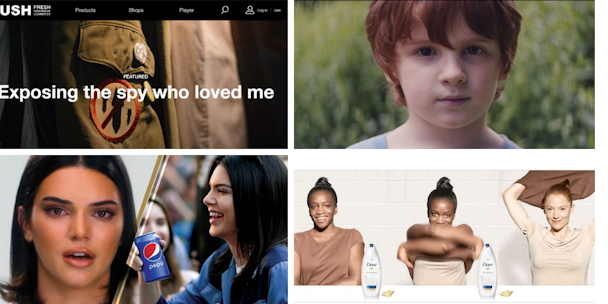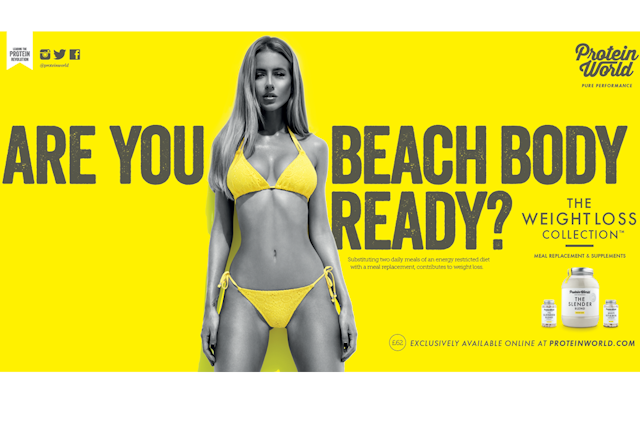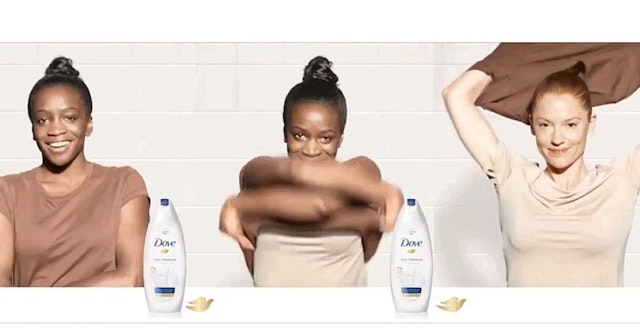7 of the most controversial ads of our time
With so much competition for attention today, controversial ads are becoming more commonplace. Brands have to be bold to be heard – and sometimes they cross the line with outrageous work.

The most controversial ads of recent times
Some agencies have even gone so far to create work they know will get banned to garner maximum publicity with minimum marketing spend. Others have absolutely no idea the impact their work will have when it plays in the wider world.
While fortune can favor the brave, the ad industry is littered with examples of bold ads that have backfired.
Here The Drum looks at some of the most controversial ads of recent times and examines why they succeeded... or failed.
Pepsi: ‘Live for Now’ (2017)
Arguably the biggest advertising flop of recent times, Pepsi's 'Live For Now' ad was pulled by the soft drink retailer in less than 24 hours of its premiere. The two-and-a-half-minute-long video sees an ethnically diverse, color-coordinated crowd of young people staging a protest against… we don’t know what, before supermodel Kendall Jenner steps in with her can of Pepsi to stop police brutality and save the day. Cue jaws dropping the world over.
The ad sparked widespread derision, and there was genuine offence caused by Pepsi’s insensitive handling of the topic (the ad appears to emulate a Black Lives Matter protest and invites a direct comparison between Jenner and protester Iesha Evans, who was arrested for her protest).
The production was condemned by everyone from Madonna to the daughter of doctor Martin Luther King. Produced by Pepsi’s in-house marketing team, the brand issued an apology to both the public and to Jenner. Kendall, however, did not address the issue publicly until the season 14 premiere of ‘Keeping up with the Kardashians’, where the model broke down to cameras and expressed that she has never felt “so fucking stupid”.
Nike: ‘Just Do It’ (2018)
To mark the 30th anniversary of Nike’s legendary marketing slogan, the sports giant chose to run a series of ads featuring athletes that had overcome huge personal and physical opposition in order to rise to the top of their profession. One such athlete was the NFL’s Colin Kaepernick, a former 49r who sparked national debate in 2016 by kneeling during the national anthem as a protest against the racial inequality that continues to pervade North America.
In a divisive creative decision, Nike chose to have Kaepernick star in and narrate its ad for ‘Just Do It’ and it certainly polarized the sportswear brand’s audience. While many applauded Nike for backing Kaepernick, who the brand has endorsed since 2011, others denounced the move as unpatriotic and threatened to boycott its products. Before long, social media was awash with #JustBurnIt and #BoycottNike hashtags, accompanied by images of destroyed or burned Nike clothing and trainers. Despite evidence of a decrease in business shares the day after the ad dropped, Nike’s sales went up 31% over the Labor Day weekend in the US.
This is not the first ad by Nike that has spurred national discussion. The same year, Nike released the ‘Nothing Beats a Londoner’ ad to mixed reviews. While the ad has been widely applauded for its positive and mobilizing message, particularly for young people, it has experienced criticism from outside the UK capital. Groups have argued that the tagline ostracizes people from the rest of the country who already feel underrepresented in the cultural sphere. Nonetheless, the ad’s production, along with its adept use of athletes like Mo Farah and musicians such as Skepta and AJ Tracey, has drawn acclaim.
Both ads were made by creative powerhouse Wieden + Kennedy.
Gillette: ‘We Believe’ (2019)
Signaling a departure from its long-established ‘The Best a Man Can Get’ tagline, in 2019 Gillette decided to offer up its two cents on the #MeToo campaign.
Its ‘We Believe’ ad aimed to tackle the trending topic of toxic masculinity and encourage men to be the best they can be, by tackling everyday sexism and the institutionalized machismo latent in a “boys will be boys” mindset. Instead of promoting the all-American, white male model archetype, this ad offered up a more diverse, multi-dimensional image of the modern man. While this change in direction has been applauded by many, it has also prompted a backlash from a wide range of people, including some of its target audience who feel disgruntled with the less-than-flattering portrait of the 21st man.
Similarly, it has come under fire from feminist groups who question the razor brand’s commitment to the #MeToo cause, since its female grooming products cost more than the male equivalent. Despite the negative backlash, there has yet to be evidence released that suggests Gillette’s market performance or sales have been negatively impacted.
The campaign may seem like a bolt from the blue, but due to rising competition from online razor companies, Gillette had to rethink its marketing strategy. The likes of Dollar Shave Club and Harry’s have been making progress in the sector with their own marketing promoting inclusivity. Dollar Shave Club’s latest campaign starred drag queens while Harry’s recently released an ad with England striker Harry Kane, proclaiming he is ‘Not Afraid’ to go against traditional male stereotypes. As brands offering newer and cheaper alternatives to Gillette, it is easy to see why the shaving giant must evolve.
The ad was produced by Grey New York and was directed by This Girl Can’s Kim Gehrig.
Protein World: ‘Are you beach body ready?’ (2015)

Seeking a larger audience for its niche product, in 2015 Protein World released a series of ads on the London Underground. One of its posters, bearing the headline ‘Are you beach body ready?’, provoked public outrage and vigilante acts of vandalism.
The public took to social media to proclaim their disdain for the ad and accused it of promoting an unhealthy body image. The UK's Advertising Standards Authority received 378 complaints regarding the campaign, a petition to have the ads removed was launched and there was even a small demonstration held against it in Hyde Park. Looking to profit from the publicity surrounding the campaign, Carlsberg weighed in with the parody: ‘Are you beer body ready?’. However, despite the ad’s controversial nature, Protein World stood by its in-house produced campaign and elicited even more ire with its responses on social media; the brand called dissenters #fattysympathisers and took a shot at feminists that voiced their objection to the ad.
In the weeks to follow, the chief marketing officer of Protein World alleged that the outcry around the ads actually benefitted the company and that the £250,000 it had spent on the campaign resulted in over £1m in sales. Ultimately, the ASA did not uphold the complaints against Protein World regarding offense or social responsibility, but it did ban the ad on the grounds of making unauthorized health and nutrition claims.
However other body image ads have not been so lucky, illustrated by Jameela Jamil’s takedown of Avon’s anti-cellulite serum. Jamil, a former model and TV presenter, attacked the brand for what she saw as irresponsible advertising and body shaming of women, which triggered a major backlash against the cosmetics company on social media. Avon apologized for the offence caused by the ad and removed it.
Lush: ‘#Spycops’ (2018)
From its inception, Lush has positioned itself as a brand which supports anti-establishment thinking and social activism. This image, bolstered by its politically acerbic campaigns, has earned the brand a league of liberal followers. However, Lush’s 2018 campaign ‘#Spycops’, which looked to draw the public’s attention to alleged illegal behavior by undercover police, did not go down so well.
The cosmetics brand found itself in the eye of a Twitter storm, with outraged users calling for a boycott of Lush’s products and starting the hashtag #flushlush. The campaign was also criticized by the UK’s home secretary, Sajid Javid. In response to these complaints, Lush issued a statement to say that its campaign was not aimed at regular police officers but instead was leveled specifically at the undercover unit that infiltrated homes and created false relationships with political activists. Nonetheless, reports of police officers and members of the public intimidating Lush staff in their places of work led to the owners deciding to remove the window dressings.
In spite of the social media backlash, Lush was not impacted negatively by the reaction to its campaign. Lush is a business built on its reputation for social activism, highlighted by its various other campaigns such as ‘Error 404’, which called out the loss of internet access in some countries. BrandWatch even reported that sales increased after its supposed PR crisis.
Dove: Facebook misfire (2017)

The champion of ‘real beauty’ has come under fire recently for what some consumers have dubbed “whitewashing”. In a Facebook ad for Dove body wash, the brand chose to portray a black woman removing her top and metamorphosizing into a white woman after using the product. This sparked outrage among the brand’s social media followers, who slammed the business with hashtags like #DoneWithDove and called for a boycott of its products.
The ad was removed by Dove and the brand publicly apologized for its misdemeanor. This misfire is not the first of its kind for the beauty brand; there are a series of accusations of whitewashing that date back to 2011 in previous skincare campaigns, as well as the controversy caused by its Real Beauty bottle designs in 2017. Despite these setbacks, Dove has scored success with GirlGaze and Getty Images, in a move to create the world's largest photographic stock library created by women and non-binary individuals. This move will hopefully protect the brand from further critique by guaranteeing equal representation in its future advertising.
Dove is owned by Unilever and has worked with the likes of Ogilvy & Mather in producing ad campaigns.
McDonald's: Filet-O-Fish (2017)
The fast-food retailer experienced massive public backlash after it released an ad for its Filet-o-Fish burger which its UK audience deemed as using child bereavement to sell burgers.
The public took to Twitter, with users calling the advert "shameless" and "icky". After the ASA received 100 complaints from viewers, McDonald's decided to pull the ad. The burger chain apologized publicly for their misjudgment of the ad's insensitive nature, with a spokesperson insisting that: "It was never our intention to cause any upset.” The brand also came under fire from a number of UK bereavement charities including Grief Encounter, who reported having received "countless calls" from grieving children and partners over the advert. The ASA launched an investigation into the ad, but no further action was necessary.
The ad was created by McDonald's long-standing creative UK agency, Leo Burnett.
